Ruthless Blu-ray Movie
HomeRuthless Blu-ray Movie 
Olive Films | 1948 | 105 min | Not rated | Mar 26, 2013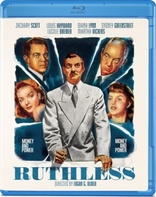
Movie rating
6.9 | / 10 |
Blu-ray rating
| Users | 0.0 | |
| Reviewer | 3.0 | |
| Overall | 3.0 |
Overview
Ruthless (1948)
Horace Vendig shows himself to the world as a rich philanthropist. In fact, the history of his rise from his unhappy broken home shows this to be far from the case...
Starring: Zachary Scott, Louis Hayward, Diana Lynn, Sydney Greenstreet, Lucille BremerDirector: Edgar G. Ulmer
| Film-Noir | 100% |
| Drama | Insignificant |
Specifications
Video
Video codec: MPEG-4 AVC
Video resolution: 1080p
Aspect ratio: 1.38:1
Original aspect ratio: 1.37:1
Audio
English: DTS-HD Master Audio Mono (48kHz, 16-bit)
Subtitles
None
Discs
25GB Blu-ray Disc
Single disc (1 BD)
Playback
Region A (B, C untested)
Review
Rating summary
| Movie | 2.5 | |
| Video | 3.0 | |
| Audio | 3.0 | |
| Extras | 0.0 | |
| Overall | 3.0 |
Ruthless Blu-ray Movie Review
Citizen Vendig, or: Baby Dude.
Reviewed by Jeffrey Kauffman March 27, 2013Well, folks, there’s subtext and then there’s subtext. Ruthless, certainly one of the oddest films in Edward G. Ulmer’s already shall we say “eclectic” oeuvre, might seem on its face a masculine version of the notorious pre-code film Baby Face, or a kind of B-movie reimagining of Orson Welles’ immortal Citizen Kane (more about both of those connections in a bit). But it’s what’s happening beneath the often turgid surface of Ruthless that might provide the most interest for observant viewers. What, for example, is going on with Horace Vendig’s (Zachary Scott) incessant “touchy-feeliness” with his erstwhile best friend Vic Lambdin (Louis Hayward)? And what exactly does it mean when Ulmer reverses the standard issue kissing scene by having Martha Burnside (Diana Lynn) clearly in the dominant position with Horace, who lies cradled in her arms in a reverse of any number of famous romantic interludes scattered throughout the long history of cinema? These are just two of several examples that leap to mind that indicate that all is not what it seems in Ruthless, a film that is supposedly an exposé (via copious flashbacks) of the corrupting power of Capitalism (the film was evidently co-written anonymously by legendary leftist Alvah Bessie), but which is more about the patently weird disconnect between an ambitious schemer and the many people who waft in and out of his life. The Baby Doll connection comes courtesy of Vendig’s insatiable (albeit nonsexual) lust for power, which is manifested via his relationships with several women whose connections can further his career. The Citizen Kane connection is all over this film, from its portrayal of a, well, ruthless tycoon whose dysfunctional early home life leads to a whole series of escapades where the character’s moral failings prevent him from ever achieving what her really wants, which in Ruthless’ case is unfortunately never made overly clear.
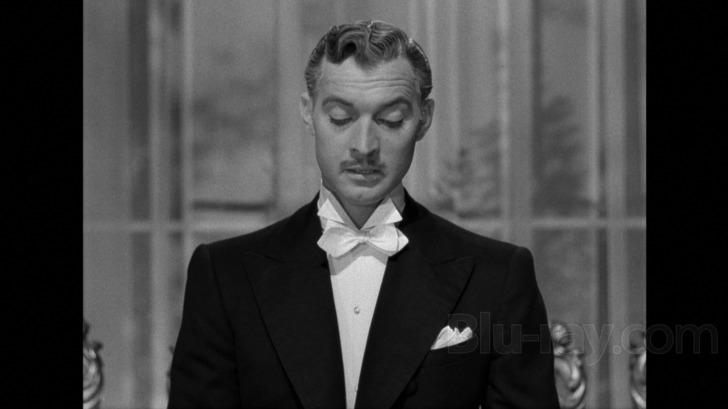
Citizen Kane was a model of nuanced screenwriting, where Welles and co-writer Herman Mankiewicz let us see the slow but inexorable progression of Kane from an idealistic young man to a twisted, agonized husk. In this regard, Ruthless is notably deficient. Via flashback we are introduced to a young trio of characters, Horace (Bob Anderson), Vic (Arthur Stone) and Martha Burnside (Ann Carter), who are enjoying an idyllic summer day in a canoe on the lake. A simmering rivalry between Horace and Vic for Martha’s attentions leads to the canoe capsizing, and Martha appears close to drowning. Horace, a champion swimmer, comes to her rescue, but is upbraided by his harridan mother (Joyce Arling) when he returns home with a ruined suit, viciously slapping the boy before he can explain what happened. When Martha’s mother (Edith Barrett) appears at the Vendig house profusely thanking Horace for having saved her daughter’s life, Mrs. Vendig only seems more upset that one of the town’s richer families is now considering the fairly destitute Vendigs suitable to talk to all of a sudden. Mrs. Vendig forbids Horace to attend a party for Martha, but Horace (with Vic in tow) sneaks off to visit his estranged father (Raymond Burr) at Mr. Vendig’s “downtown” saloon. (Both the character of Mr. Vendig, as well as his harridan girlfriend, not to mention the gin joint setting seem to have been lifted from a bus and truck version of O’Neill’s Anna Christie.) Horace tries to finagle money for a new suit so that he can go to Martha’s party, a strategy which backfires, and when he returns home, he finds his mother in the arms of an erstwhile lover who is urging her to get rid of Horace so that they can consummate their romance. Horace heads straight for the Burnside home where he spills his tearful guts to Mrs. Burnside, who along with her husband decides to take young Horace in and raise him as their own.
Now believe it or not, this whole episode only takes up the first few minutes of Ruthless’s long interior flashback, but it sets up one of the fatal flaws in the film. Horace is shown to be an intrinsically decent little boy dealing with two pretty horrible parents. When he’s taken in by the Burnsides, themselves the very model of domesticity and normalcy, one would think all is finally right with the world. But when the film segues forward to the focal trio’s young adult years, there’s been a completely inexplicable change in Horace. Now he’s a scheming social climber, one who professes love to Martha evidently only because Vic wants her, too, but who then uses her father to get a Harvard education and a leg up into society where he moves on to a string of other women whom he sees as mere stepping stones to success. Unlike Citizen Kane, there’s a gaping maw between the child Horace and the young adult Horace, a chasm that the film never explains and which leaves a certain vacuum at the emotional center of the piece.
Ruthless is a weirdly dichotomous experience, one that is both oddly compelling while at the same time cold and impersonal, lacking any real emotional heft. Scott excelled at playing smarmy villains, and one would think he would be perfectly cast as Vendig, but there’s something slightly dissociative about his portrayal here, perhaps due to either the intentional or unwitting subtext (or subtexts) alluded to above. The best elements in Ruthless are some of the supporting performances. Diana Lynn is pitch perfect in a dual role, as both the adult Martha and another character named Mallory who is Vic’s date at a huge shindig honoring Horace late in life and whose resemblance to Martha sets the whole flashback ball rolling. While Louis Hayward is fine as Vic, I personally couldn't get past his faux patrician idiolect, where his pronunciation of "Horace" sounds rather humorously like "Hoss". Perhaps the most surprising performance in Ruthless is a fantastic turn by Sydney Greenstreet playing another ruthless Capitalist whose path crosses Vendig’s. There are a couple of knockout scenes with Greenstreet’s character and his younger wife (a woman who has captured Vendig’s eye) that reveal an unexpected level of pathos in an actor more commonly known for his smarmy villains.
Ruthless Blu-ray Movie, Video Quality 
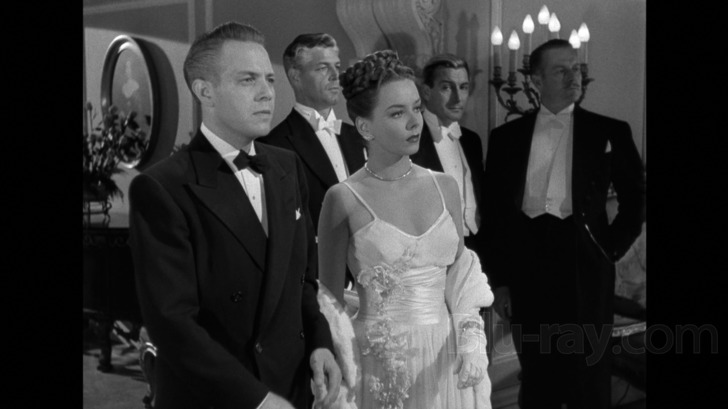
Ruthless is presented on Blu-ray courtesy of Olive Films with an AVC encoded 1080p transfer in 1.38:1. The elements here are in mostly decent if not excellent shape, with some notable exceptions. There's a bit of damage in the first moments of the film (mostly in the credits sequence), after which things improve dramatically until the gazebo scene where Lynn confesses to Scott that she isn't going to marry Hayward. There is some pretty bad damage here which includes wildly fluctuating contrast, which varies from something which looks more or less accurate to an overblown ambience that resembles a horribly faded print. These changes balloon in and out of each other over and over during this sequence (see the tenth screenshot for an example of the milky white overlay that comes and goes during this segment). If you can get past these anomalies and don't mind the expected scratches, flecks and specks as well as some recurrent damage on the very sides of the frame (mostly on the right), the bulk of this presentation is reasonably sharp and well detailed, though perhaps not quite at the level we've seen from some other vintage black and white releases that Olive has offered.
Ruthless Blu-ray Movie, Audio Quality 
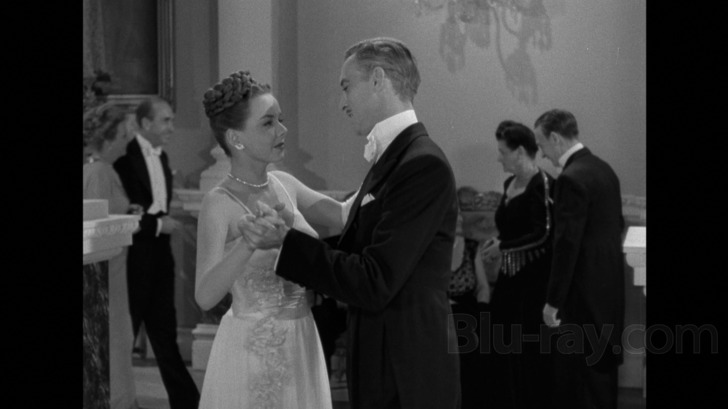
Ruthless features a lossless DTS-HD Master Audio Mono mix which, like the video quality, has some issues but which is generally speaking okay sounding given reasonable expectations. There's some minor albeit noticeable distortion in the opening theme music, and then when Diana Lynn makes her first appearance, you'll hear what is the first of a few fairly loud pops that dot the aural landscape. But once the film gets into its long flashback period, things improve quite a bit, although there's a fairly narrow midrange that keeps this track from every really sounding very full bodied. Dialogue is always easy to hear and fidelity is reasonable (again, given appropriate expectations) but dynamic range is virtually negligible.
Ruthless Blu-ray Movie, Special Features and Extras 
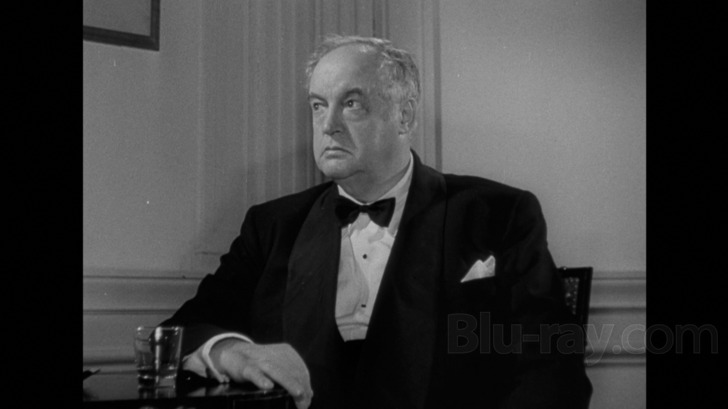
No supplements of any kind are offered on this Blu-ray disc.
Ruthless Blu-ray Movie, Overall Score and Recommendation 

I spent long swaths of Ruthless with my jaw semi-agape wondering "Did they really mean to do that?" It's always interesting to look back on these older films which were made within the moral constraints of their era and question whether the filmmakers were truly covering up some kind of insidious intent or if we're imposing that kind of perspective now from our cynically modern point of view. That kind of analysis is perhaps one of the more interesting things about Ruthless, a film which otherwise tends to not deliver on its initial promise. Is Martha supposed to be Vendig's "Rosebud", as it were? Is the film supposed to be a scathing indictment of the "horrors" of Capitalism? And let's just come out and say it—is Vendig a closet case? The film hints at all of these aspects but never really has the courage to confront them head on, making the dramatic arc stilted and less emotionally resonant than it might have otherwise been. Still, there are some excellent supporting performances to be had here, so those with an interest in Ulmer and/or any of the actors may want to check out this decidedly odd little film.
Similar titles
Similar titles you might also like

The Strange Love of Martha Ivers
4K Restoration
1946

Flamingo Road
Warner Archive Collection
1949

Scarface
1932

Angels with Dirty Faces
Warner Archive Collection
1938

All the King's Men
Limited Edition to 3000 - SOLD OUT
1949

Nightmare Alley
1947

Stranger on the Prowl
Imbarco a mezzanotte
1952

Caught
1949

The Window
Warner Archive Collection
1949

Sudden Fear
1952

Boomerang
1947

The Enforcer
1951

Don't Bother to Knock
Limited Edition to 3000
1952

Body and Soul
1947

Force of Evil
4K Restoration
1948

99 River Street
1953

He Ran All the Way
1951

Champion
1949

Night and the City
1950

The Accused
1949